#emergency management.
Text
youtube
#youtube#militarytraining#2024#public safety#Homeland Security#critical infrastructure#crisis management#homeland defense#security camera#unseen#national security#government agency#emergency preparedness#emergency response#natural disaster#news footage#emergency management.#law enforcement#first responders#surveillance footage#disaster footage#B-roll
0 notes
Text
Wildfire Preparedness Day 2024
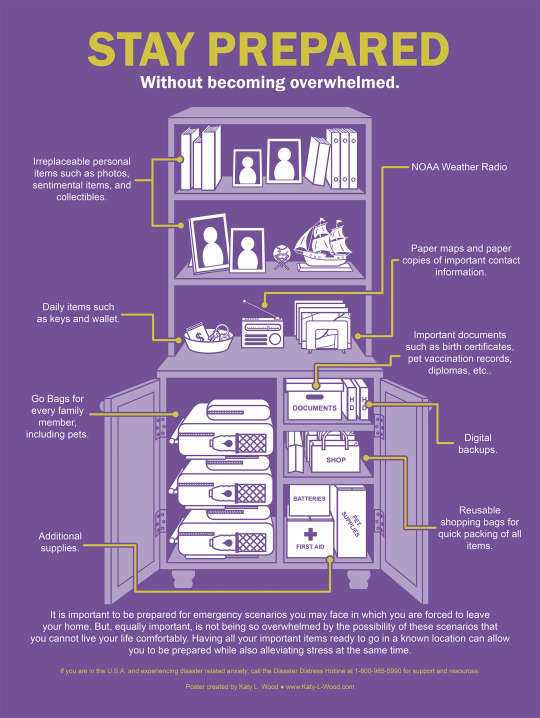
(Alt text included within image.)
May 4th is not just Star Wars day, it's also Wildfire Preparedness day! So what better time to finally share my new preparedness poster?
One thing I hear a lot when discussing wildfire preparedness is that people want to protect their most treasured items, so they have them pre-packed to make them easy to grab in the event of an emergency. I've always found this kind of sad. Understandable! But sad. You shouldn't have to hide away the things you love.
Which is where the concept of a preparedness shelf comes in. The idea here is to keep all your evacuation based stuff AND your "save first" items in one spot where they can be displayed instead of hidden away, but still easily grabbed and evacuated.
This has several advantages. For one, you don't have to hide away the things you love but they will still be easy to access in one central spot. For two, if you are not home at the time of evacuation and someone else is (maybe a partner, or your neighbor, or an older child) and they call you and ask what you want them to grab, you do not have to direct them all over your house, just to one central location.
As always, use your best judgement about the hazards in your area and what works for you.
If you are in the U.S.A. and experiencing disaster related anxiety, call the Disaster Distress Hotline at 1-800-985-5990 for support and resources.
If you would like a print of this poster, you can get the high quality digital file on my website for $3, and discounted rates are available if you would like to purchase the right to make more prints! You can get files of the evacuation prep poster the same way!

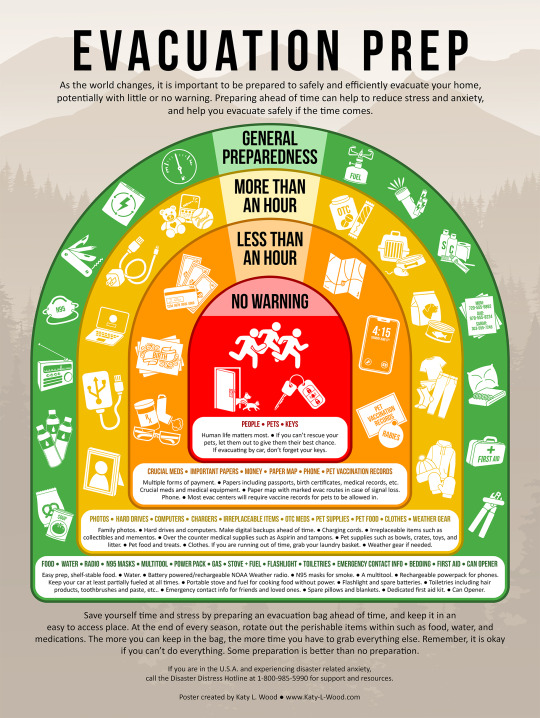
#Emergency Management#Disaster#Natural Disaster#Preparedness#Disaster Preparedness#Wildfire#Evacuation
6K notes
·
View notes
Text
Dp x Dc AU: Jazz Fenton, after years of fixing her brother’s injuries, becomes a Doctor with an inclination towards behavioral health and psychology- In order to make the difference she wants to see in the world she joins Dr. Leslie Thompkin’s practice.
Jazz Fenton, M.D. has spent years of her life doing research, doing the hard work and the emotional labor, and finally, finally, she’s joining a practice she can feel 100% confident in. She’s goddamn good doctor and she wants to make the biggest impact that she can.
Dr. Thompkins (who insists that she call her Leslie as they’re colleagues now), is a kind woman, sharp as a tack and keeps her practice open at odd hours to help the most unfortunate. It took some time for them to bond and trust to be built, but now Jazz is being allotted a few night shifts here and there.
It’s incredible. Jazz gets to spend time with the kids who come in and really talk to them (in addition to getting them antibiotics, heating pads and pokemon themed bandaids) to help equip them with a few coping skills. Her passion for psychology never disappeared after all, but the expansive knowledge of how to heal the human body has made her find a sense of fulfillment like no other.
Having proven herself and worn Leslie down, Jazz now takes up about 1/3 of all the night shifts in the month. She’s hoping to get to 50/50 by the end of the year but she’s content with what she has. Danny keeps odd hours anyway so calling him after work on her walk home can happen any time of day and he will always answer enthusiastically.
It’s a particularly busy night before he comes in. The Red Hood.
He was known for being an ally to Leslie, despite being on contentious terms with the Bats, but Jazz had never asked directly. Never one to turn away a patient with bullet hole wounds, she hops into action to get his wounds cleaned, sewed up and gauze wrapped. She’s handing him a sheet (an Infographic! Dani made it with her! Graphic design is her passion!) on how to care for his wounds when he first seems to recognize that she’s not Leslie.
“No, Of course not. I’m Dr. Fenton. I can’t blame you for not remembering but I did introduce myself as you bled in the entry way. You’re Red Hood, right?”
“Hm. Didn’t realize the practice was expanding. Where can I find-” He grumbles before pushing her hand aside from where she had still been supporting his shoulder.
“Hold on there, mister. You’re going home, you’re following this infographic and you’re going to get some sleep.”
“Lady you don’t know-” His voice modulated ton came across antagonistically. As if he was trying to intimidate her. Ha, Jazz rolls her eyes at the inclination.
“Who I’m talking to? Who I’m dealing with? You’re hilarious. I can eat you vigilante’s hero complexes for breakfast. Tell me who I’m calling to pick you up and then you can say thank you.” Jazz snaps at him. It really had been a long night but his whole dialogue thus far is making her a bit batty.
“Oh really Doc? You know Leslie’s tough shit, and from what I can tell you’ve got nothing on her-”
“Trying to make me feel insufficient when I just saved your life? That’s cute. I’m sure a lifetime of abandonment by both of your parental figures gave you that. I’m also sure that you inherited this desire to prove you’re not going to be dependent on anyone who wants to help from whoever got you dressing up in tights to fight crime in the first place. Again, I’d love to talk at length about how predictable you-”
“Bwah- wait- I’m Predictable? You’re probably some nepobaby who had parents who told her she could have the world-” But Jazz cuts him off with hysterical laughter- he couldn’t be further from the truth. Her parents loved her, but nepotism? With what, the ghosts? If anything she got that from Danny, but he doesn’t need to know about her ghostly titles.
“You’re just some guy who came back from the dead and made his trauma everyone else’s issue. So shut it. And tell me how I’m getting you home from this clinic.” She seethes though her voice stays devastatingly level with each word.
Speechless for a moment, he eventually relents to Jazz that he’s already called for help on the comms but it will be hours before they can come for a pick up. The sun had already come up and the night had been over for most of them before Hood had walked into trouble. She groans and the realizes the time for herself and the empty clinic around them.
“Fine. My shift just ended anyway. I’ll get you home in one piece and I swear to all the ancients that you’d better follow the directions on the infographic.”
And that’s how Jazz ended up calling her brother while supporting the weight of a grown ass man (who no longer wanted to talk to her) on her walk home.
The next time Red Hood appears in her clinic, he’s brought a dozen roses in addition to the cut on his neck that definitely needs to be pressurized like ASAP. Did he stop for the flowers on his way to the clinic? He’s going to pass out from blood loss! She doesn’t even like roses!
#ehehehe#dpxdc#dcxdp#dp x dc#dc x dp#danny phantom#dc crossover#dp crossover#anger management#jazz fenton#jason todd#she still loves psychology but its a back pocket tool to her knowledge as an emergency medicine provider#jazz is ready to throw hands because becoming a princess during med school sucked ass#she did not have the time#but she loves and supports anything danny is doing sooo...#danny is currently attending gotham u for engineering but lives across town so they just call everyday#he sees her on her off days and always brings her tons of fast food#jason is immediately smitten with the woman put him in his place#the pit maddness was barking up a storm this entire convo but she got him home and he was like holy fuck im in love#jason todd said she saw right through me and that shit was hot#yes he totally stopped to grab (steal) flowers on his way to the clinic#dick picks him up this time. sees the flowers and is like oh cool its my turn to wingman for my lil bro#jazz is worn down by sweet gestures and the fact that hes legit so nice now when he comes into the clinic#he quotes poetry at her sometimes and she's like omg did you just make that up? she's never read poetry a day in her life#only medical textbooks and psychology papers#long post
3K notes
·
View notes
Text
Prompt 160
Constantine might have made a slight mistake. Just an itty bitty one. Okay maybe not an itty bitty one, but it’s not like he usually deals with Realms beings! No one deals with Realms beings if they can help it, and never willingly!
So maybe he had been a little more drunk than usual, and maybe a tiny bit more desperate. But he’s pretty sure he didn’t do any hanky-panky with anyone. So he’s very confused as to how the fuck, he apparently has not just one, but three Realms-cores?!
Seriously, what the actual fuck, who looked at him of all people and decided, yeah, he looks like he could be a dad?! Mom!? Whatever the fuck it is.
What the fuck is he supposed to do in this situation!?
#DcxDp#DpxDc#prompts#Constantine is having a meltdown#He’s the one whose always telling other people to not mess with stuff they don’t understand#And then This fuckin happens#Halfas are like phoenixes when they emerge from their cores because they have to completely regrow their bodies#Constantine is Not prepared for three Realms-babies#How did this happen? Good question- Go wild#He is going to hide this from JL & JL Dark for as long as he can manage#It's either the Dannys; Team Phantom; or 3 of Danny's clones#does it count as mpreg if it's ghost cores
1K notes
·
View notes
Text
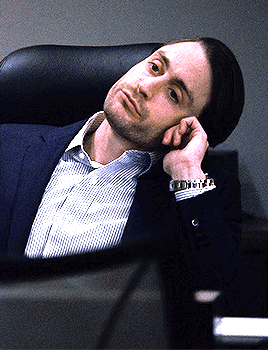
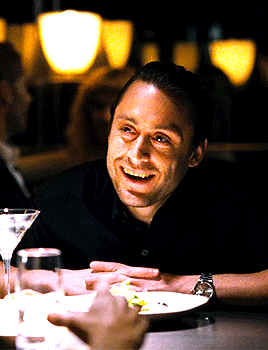
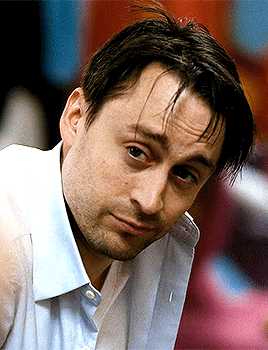
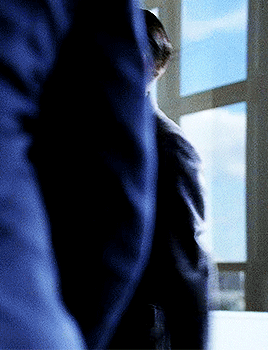
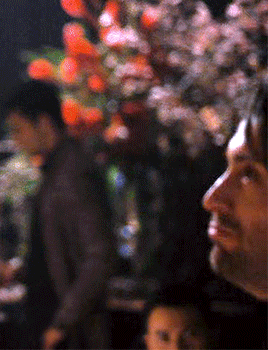
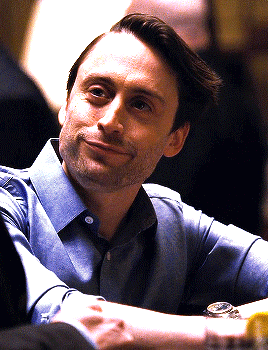


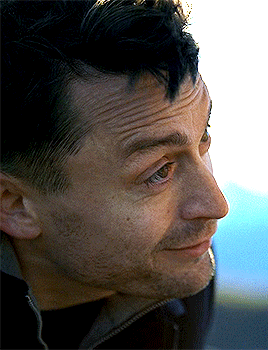
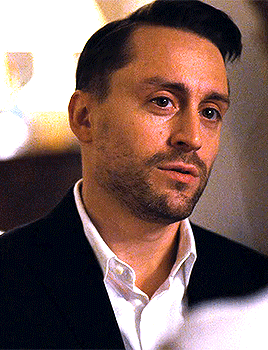
"I specifically don’t want to think about his sexuality. I don’t think he has that down or actually really understands what that is, so I don’t want to understand it. There’s a good analogy I heard about a golf swing—I don’t fucking play golf so I don’t know—but there are nine very specific things you’re supposed to do in a golf swing. But if you want it to be perfect, you have to learn all of them and forget all of it. So I don’t want to have to learn every aspect of him and then work extra hard to not know... there’s something I intuitively sort of understand about his sexuality." - Kieran Culkin
ROMAN ROY looking at men | Succession (2018 - 2023)
#successionedit#roman roy#kieran culkin#tvedit#succession#me *emerges from closely examining these scenes covered in blood and tears* haha here's some gifs haha#kieran somehow manages to do this face that's like lust / shame / 7 stages of grief all at the same time he's insane#/
1K notes
·
View notes
Text
"What's happening?" said Lobsang, as the last of the monks surged past.
"I daresay we shall soon be told," said Lu-Tze, starting to roll himself a cigarette.
"Hadn't we better hurry? Everyone's going!" The sound of flapping sandals died away in the distance.
"Nothing seems to be on fire," said Lu-Tze calmly. "Besides, if we wait a little then by the time we get there everyone will have stopped shouting and perhaps they will be making some sense."
Terry Pratchett, Thief of Time
#lobsang#lu tze#thief of time#discworld#terry pratchett#history monks#emergency#panic#crisis#crisis response#crisis management#hurry#patience#waiting#fomo#everyone's doing it#nothing seems to be on fire#makes sense
112 notes
·
View notes
Text
Insurance companies are making climate risk worse
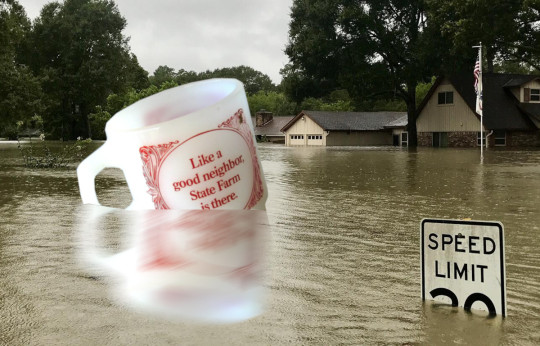
Tomorrow (November 29), I'm at NYC's Strand Books with my novel The Lost Cause, a solarpunk tale of hope and danger that Rebecca Solnit called "completely delightful."

Conservatives may deride the "reality-based community" as a drag on progress and commercial expansion, but even the most noxious pump-and-dump capitalism is supposed to remain tethered to reality by two unbreakable fetters: auditing and insurance:
https://en.wikipedia.org/wiki/Reality-based_community
No matter how much you value profit over ethics or human thriving, you still need honest books – even if you never show those books to the taxman or the marks. Even an outright scammer needs to know what's coming in and what's going out so they don't get caught in a liquidity trap (that is, "broke"), or overleveraged ("broke," again) exposed to market changes (you guessed it: "broke").
Unfortunately for capitalism, auditing is on its deathbed. The market is sewn up by the wildly corrupt and conflicted Big Four accounting firms that are the very definition of too big to fail/too big to jail. They keep cooking books on behalf of management to the detriment of investors. These double-entry fabrications conceal rot in giant, structurally important firms until they implode spectacularly and suddenly, leaving workers, suppliers, customers and investors in a state of utter higgeldy-piggeldy:
https://pluralistic.net/2022/11/29/great-andersens-ghost/#mene-mene-bezzle
In helping corporations defraud institutional investors, auditors are facilitating mass scale millionaire-on-billionaire violence, and while that may seem like the kind of fight where you're happy to see either party lose, there are inevitably a lot of noncombatants in the blast radius. Since the Enron collapse, the entire accounting sector has turned to quicksand, which is a big deal, given that it's what industrial capitalism's foundations are anchored to. There's a reason my last novel was a thriller about forensic accounting and Big Tech:
https://us.macmillan.com/books/9781250865847/red-team-blues
But accounting isn't the only bedrock that's been reduced to slurry here in capitalism's end-times. The insurance sector is meant to be an unshakably rational enterprise, imposing discipline on the rest of the economy. Sure, your company can do something stupid and reckless, but the insurance bill will be stonking, sufficient to consume the expected additional profits.
But the crash of 2008 made it clear that the largest insurance companies in the world were capable of the same wishful thinking, motivated reasoning, and short-termism that they were supposed to prevent in every other business. Without AIG – one of the largest insurers in the world – there would have been no Great Financial Crisis. The company knowingly underwrote hundreds of billions of dollars in junk bonds dressed up as AAA debt, and required a $180b bailout.
Still, many of us have nursed an ember of hope that the insurance sector would spur Big Finance and its pocket governments into taking the climate emergency seriously. When rising seas and wildfires and zoonotic plagues and famines and rolling refugee crises make cities, businesses, and homes uninsurable risks, then insurers will stop writing policies and the doom will become undeniable. Money talks, bullshit walks.
But while insurers have begun to withdraw from the most climate-endangered places (or crank up premiums), the net effect is to decrease climate resilience and increase risk, creating a "climate risk doom loop" that Advait Arun lays out brilliantly for Phenomenal World:
https://www.phenomenalworld.org/analysis/the-doom-loop/
Part of the problem is political: as people move into high-risk areas (flood-prone coastal cities, fire-threatened urban-wildlife interfaces), politicians are pulling out all the stops to keep insurers from disinvesting in these high-risk zones. They're loosening insurance regs, subsidizing policies, and imposing "disaster risk fees" on everyone in the region.
But the insurance companies themselves are simply not responding aggressively enough to the rising risk. Climate risk is correlated, after all: when everyone in a region is at flood risk, then everyone will be making a claim on the insurance company when the waters come. The insurance trick of spreading risk only works if the risks to everyone in that spread aren't correlated.
Perversely, insurance companies are heavily invested in fossil fuel companies, these being reliable money-spinners where an insurer can park and grow your premiums, on the assumption that most of the people in the risk pool won't file claims at the same time. But those same fossil-fuel assets produce the very correlated risk that could bring down the whole system.
The system is in trouble. US claims from "natural disasters" are topping $100b/year – up from $4.6b in 2000. Home insurance premiums are up (21%!), but it's not enough, especially in drowning Florida and Texas (which is also both roasting and freezing):
https://grist.org/economics/as-climate-risks-mount-the-insurance-safety-net-is-collapsing/
Insurers who put premiums up to cover this new risk run into a paradox: the higher premiums get, the more risk-tolerant customers get. When flood insurance is cheap, lots of homeowners will stump up for it and create a big, uncorrelated risk-pool. When premiums skyrocket, the only people who buy flood policies are homeowners who are dead certain their house is gonna get flooded out and soon. Now you have a risk pool consisting solely of highly correlated, high risk homes. The technical term for this in the insurance trade is: "bad."
But it gets worse: people who decide not to buy policies as prices go up may be doing their own "motivated reasoning" and "mispricing their risk." That is, they may decide, "If I can't afford to move, and I can't afford to sell my house because it's in a flood-zone, and I can't afford insurance, I guess that means I'm going to live here and be uninsured and hope for the best."
This is also bad. The amount of uninsured losses from US climate disaster "dwarfs" insured losses:
https://www.reuters.com/business/environment/hurricanes-floods-bring-120-billion-insurance-losses-2022-2023-01-09/
Here's the doom-loop in a nutshell:
As carbon emissions continue to accumulate, more people are put at risk of climate disaster, while the damages from those disasters intensifies. Vulnerability will drive disinvestment, which in turn exacerbates vulnerability.
Also: the browner and poorer you are, the worse you have it: you are impacted "first and worst":
https://www.climaterealityproject.org/frontline-fenceline-communities
As Arun writes, "Tinkering with insurance markets will not solve their real issues—we must patch the gaping holes in the financial system itself." We have to end the loop that sees the poorest places least insured, and the loss of insurance leading to abandonment by people with money and agency, which zeroes out the budget for climate remediation and resiliency where it is most needed.
The insurance sector is part of the finance industry, and it is disinvesting in climate-endagered places and instead doubling down on its bets on fossil fuels. We can't rely on the insurance sector to discipline other industries by generating "price signals" about the true underlying climate risk. And insurance doesn't just invest in fossil fuels – they're also a major buyer of municipal and state bonds, which means they're part of the "bond vigilante" investors whose decisions constrain the ability of cities to raise and spend money for climate remediation.
When American cities, territories and regions can't float bonds, they historically get taken over and handed to an unelected "control board" who represents distant creditors, not citizens. This is especially true when the people who live in those places are Black or brown – think Puerto Rico or Detroit or Flint. These control board administrators make creditors whole by tearing the people apart.
This is the real doom loop: insurers pull out of poor places threatened by climate disasters. They invest in the fossil fuels that worsen those disasters. They join with bond vigilantes to force disinvestment from infrastructure maintenance and resiliency in those places. Then, the next climate disaster creates more uninsured losses. Lather, rinse, repeat.
Finance and insurance are betting heavily on climate risk modeling – not to avert this crisis, but to ensure that their finances remain intact though it. What's more, it won't work. As climate effects get bigger, they get less predictable – and harder to avoid. The point of insurance is spreading risk, not reducing it. We shouldn't and can't rely on insurance creating price-signals to reduce our climate risk.
But the climate doom-loop can be put in reverse – not by market spending, but by public spending. As Arun writes, we need to create "a global investment architecture that is safe for spending":
https://tanjasail.wordpress.com/2023/10/06/a-world-safe-for-spending/
Public investment in emissions reduction and resiliency can offset climate risk, by reducing future global warming and by making places better prepared to endure the weather and other events that are locked in by past emissions. A just transition will "loosen liquidity constraints on investment in communities made vulnerable by the financial system."
Austerity is a bad investment strategy. Failure to maintain and improve infrastructure doesn't just shift costs into the future, it increases those costs far in excess of any rational discount based on the time value of money. Public institutions should discipline markets, not the other way around. Don't give Wall Street a veto over our climate spending. A National Investment Authority could subordinate markets to human thriving:
https://democracyjournal.org/arguments/industrial-policy-requires-public-not-just-private-equity/
Insurance need not be pitted against human survival. Saving the cities and regions whose bonds are held by insurance companies is good for those companies: "Breaking the climate risk doom loop is the best disaster insurance policy money can buy."
I found Arun's work to be especially bracing because of the book I'm touring now, The Lost Cause, a solarpunk novel set in a world in which vast public investment is being made to address the climate emergency that is everywhere and all at once:
https://us.macmillan.com/books/9781250865939/the-lost-cause
There is something profoundly hopeful about the belief that we can do something about these foreseeable disasters – rather than remaining frozen in place until the disaster is upon us and it's too late. As Rebecca Solnit says, inhabiting this place in your imagination is "Completely delightful. Neither utopian nor dystopian, it portrays life in SoCal in a future woven from our successes (Green New Deal!), failures (climate chaos anyway), and unresolved conflicts (old MAGA dudes). I loved it."

If you'd like an essay-formatted version of this post to read or share, here's a link to it on pluralistic.net, my surveillance-free, ad-free, tracker-free blog:
https://pluralistic.net/2023/11/28/re-re-reinsurance/#useless-price-signals
#pluralistic#doom loop#insurance#insuretech#climate#climate risk#climate emergency#the lost cause#market forces#risk management#price signals#control boards#decarbonization#bond vigilantes#climate resilience
265 notes
·
View notes
Text
“You know, I’ve spent years looking at the stars and yet, you still manage to outshine them all.” + fluff, established relationship ; requested by @xysidhequeen!
The Signal didn’t often go out at night. He sticks to working during the day as often as he can, a visible figure of safety that the people of Gotham could rely on. He mostly works alone during the day, with only his husband’s voice in his ear (and sometimes flying by his side), and spends the night recovering so he can do it all over again.
But tonight, he’s grappling through the streets, working with Batgirl and Red Hood to bust a trafficking operation. The rest of the Bats are either working cases in other parts of the world, or too injured to go out despite their best efforts to say otherwise. He’s already feeling tired, not as young as he used to be and lacking the energy he had in high school to do so much each day.
They need the help, which is why he agreed to help out, but Danny had managed to switch him from being one of the heavy hitters to being backup and rescue, so he can whisk away any victims he finds through shadows to deliver them to Gordon, who waits on standby a few streets away with emergency medical services with him. Not a perk he was expecting from marrying someone else in the hero business, but definitely one he appreciates.
He wishes Danny were still in his ears, humming softly on comms as Duke fits himself into the shadow of the warehouse the traffickers are hiding in. Batgirl and Red Hood take to the roofs as Duke slips inside, stepping out of the shadows onto the catwalk, crouching down so no one spots him. The shadows drape over him, a comforting weight, as he reaches out and rips away the weak lights on in the warehouse.
The added darkness allows Batgirl and Red Hood to slip inside, positioning themselves on the crossbeams, watching the people below them move about.
They speak in hushed voices, eyes flickering nervously from the windows to the door. Guns are held in white-knuckled grips; they all know they shouldn’t step into Bat territory, but the call of powerful criminal families like the Falcones is too much for them to resist.
“Victims should be held in freight boxes at the other end of the warehouse,” Red Hood says, voice low as he shifts his weight, ready to drop down and make the traffickers beg for mercy.
“Try to draw everyone to this end, then, and I’ll get the victims out of here.”
“You got it. Ready, Batgirl?”
Batgirl lifts her cowl to tuck her blond bangs out of her face, then grins. “Ready.”
They drop from the ceiling at the same moment, landing on two traffickers and taking them out instantly. The warehouse is filled with shouts and gunfire as the vigilantes weave their way around the space, hitting hard and kicking away guns as soon as they can.
Duke grabs onto a shadow and follows it along the wall, letting it carry him down to the floor. No one guards the freight boxes, making it all the easier to wrench them open. The movement makes his left shoulder twinge, and Duke winces, knowing it’ll be a pain in the morning.
The people huddled inside the freight box cry out, alarmed and frightened, when he steps inside.
“Hey, it’s alright, I’m here to get you guys to safety,” he soothes, hands raised in front of him.
The youngest of them are the first to run to him, whispering fervent thanks as he pulls the shadows over them, hiding them from sight, then taking them to Gordon. He makes the trip multiple times, the other victims eager to be free from the hell they’ve experienced.
There are tears and panic attacks and people clutching to each other, relieved that their nightmare is over.
Thankfully, there weren’t that many victims. It’s the smallest silver lining, but after all these years, Duke knows to take what he can get. It’s all to easy to let despair take over. If he wants to save people, he has to keep fighting for the smallest hopes of a better future.
“All victims have been rescued,” he announces, standing outside the warehouse. “Need any help in there?”
“Nah, we’re good,” Batgirl says. Her words are followed by a grunt, a swear, and then her manic laughter. From the sound of it, someone got a lucky shot in and Batgirl repaid it with a particularly nasty nerve strike.
“We got it covered from here. Just need to interrogate a few guys, then we’ll let the pigs clean up this mess,” Red Hood adds.
“Alright, I’m gonna head in, then.”
Batgirl sends him off with a cheerful “Sleep tight, don’t let the lovebugs bite too much!” It’s been years since he accidentally went on patrol with a fully visible hickey and she still refuses to let it go.
Duke sighs, then turns off his comm. He grapples up to the roof and begins making his way back towards the apartment, far too tired to bother with going to the Hatch. He’s got plenty of hidden storage space to hide away his suit for a day, and the Hatch doesn’t have Danny, so of course he’s not going to go there.
All he wants to do after such a long day is go home, where Danny should be.
Should be, because not even five minutes into crossing the city, Duke catches sight of the white star-glow of Danny up on a rooftop.
He changes course immediately, turning towards Danny before he fully processes what he’s seeing, as if he’s being pulled into his orbit.
Danny’s sitting on the edge of a building as Phantom, his gas mask hanging loose around his neck.
He beams as Duke lands on the building, reaching up for him as Duke takes off his helmet and crouches down to kiss him.
“You know,” Danny murmurs against his lips, “I’ve spent years looking at the stars, and yet you still manage to outshine them all.”
Six years of marriage and Danny still manages to fluster him. Duke laughs, dropping his head onto Danny’s shoulder. “Well, hello to you too, you flirt. What was that for?”
“I saw you saving those people tonight. They looked at you like you were the sun. I’m glad other people are seeing how wonderful you are.”
“You flatter me too much. What brought you out here so late? I thought you were sleeping.”
Danny shrugs, looking down at the street. “I tried, but a ghost insisted I follow them out here. I didn’t realize how close I was to you until I got here, and then I just couldn’t resist watching you in action.”
“And you wanted to make sure I was fine.”
“That too,” Danny admits. They’ve long since settled any arguments about trust and believing each other to be able to handle the fights they throw themselves into. Danny’s need to protect and self sacrifice because he’s ‘already dead, what’s another thirty bullets going to do?’ and Duke’s determination to do things his way, working off visions of the future he doesn’t have time to communicate meant they fought often and loudly in the early stages of their relationship. Time has tempered those feelings, and now it’s clear to see that Danny simply wants him safe, and Duke doesn’t mind using his status as a hero or his powers to give Danny some special treatment.
Danny checking up on him in fights doesn’t make him think Danny sees him as weak and in need of help. It just makes him feel loved, grateful to know his husband would always be there for him, even if it’s in the sidelines, ready to fly them home.
“What did the ghost need?” he asks, lifting his head from Danny’s shoulder.
“Well…” Danny trails off. “How do you feel about pets?”
“Sweetheart, did a ghost ask you to adopt their dog?”
Danny’s expression falls, and Duke’s heart twists. He pulls Danny into his arms without second thought, offering him what comfort he could.
“Not a dog,” he says. “And it wasn’t a human ghost. It was a cat. A cat that had kittens and died because there wasn’t enough food for her on the streets.”
“Oh, sweetheart,” Duke says. Animal deaths have always hit Danny hard, and it’s this that made Damian accept Danny as part of the family, insisting on helping ghost animals with him.
“I’ve already texted Dami about the kittens. He’s going to swing by our place tomorrow to pick them up, but there are two that attached themselves to me and I don’t want to let them go.”
“Let’s go get them and take them home. And then we can start thinking of names for them.”
Danny peeks up at him shyly, then breaks out into a relieved smile. “Really? Thank you! I love you so much.” He jumps to his feet and kisses Duke quickly, then is flying down to get the kittens before Duke can do anything.
He flies back up with a cardboard box full of tiny little ‘meows’ that are already melting Duke’s heart from cuteness.
“I buried mama cat already, so I think we’re good to go.”
Duke aims his grapple again, and with Danny by his side, soars above the city. Neither of them are going as fast as they usually do, carefully aware of the kittens in the box. When they get to their apartment, Duke lands on the balcony and opens the door so Danny can fly in without risking intangible kittens escaping. He sets the box down gently on the floor of the living room, then grabs his wallet and flies out again, tossing a quick explanation of buying food for them over his shoulder.
Left alone with the kittens, Duke peeks into the box to coo at them before heading to the bedroom to change into sweatpants. His gear is left tucked into the back of the closet, hidden by some heavy winter coats.
The kittens are crying when he gets back to the living room. Their little cries are too hard to resist, so Duke uses the shadows to create a small playpen for them, keeping them contained in a small area in front of the couch. He sits on the ground and carefully pulls each kitten out, freeing them from their cardboard confines.
Within seconds, the kittens are toddling around unsteadily, so small and scraggly, with eyes that have only just opened peering around curiously. Duke pets them with a single finger, terrified of hurting their fragile bodies.
He’s covered in kittens climbing over his lap when Danny returns.
His husband takes a moment by the door, in human form, to give him a sappy smile, so visibly in love it makes Duke blush. “You’re the best thing I’ve ever seen,” he says, breathlessly, and carelessly drops his bag of kitten supplies on the ground to cross the distance between them and kiss Duke sweetly.
“Such a sweet talker today,” Duke comments as he pulls away.
“Can you really blame me? I have the best husband in the world who saves people and kittens and has the best smile and reminds me how much good is still left in the world.”
Duke’s mind short circuits at Danny’s words. Instead of saying how much he loves Danny, with his need to protect, his big heart, the way he always puts his cold hands on Duke’s temples before Duke himself realizes how bad his migraine is, what he says is, “Can we name one of the kittens Polaris?”
“Best husband in the world,” Danny says again, his voice soft. “I love that name. Yes, let’s name one Polaris.”
Sitting there at almost four in the morning, just coming in from saving victims of human trafficking, should be exhausting and painful and lead to a long night of wondering how long he can keep fighting when there’s no end to human cruelty. But his heart is light, leaning into his husband with kittens crawling over them.
There is good in the world. So much good.
The best is sitting besides him in their dark living room, and Duke knows that as long as Danny is by his side, he’ll keep fighting for all the good still out there. The world could be so much better, and he’s determined to make it better for Danny.
A world where kittens are safe even in the streets.
That’s the world he’ll make for Danny.
#ghostlights#dc x dp#dp x dc#dcxdp#dpxdc#dc x dp fic#dp x dc fanfic#prompt fill#my writing#a little look into their lives years in the future where theyre married and still being heroes#duke remains the daytime hero and phantom is a rarely seen hero who only comes out for huge emergencies. or to be with the signal.#theres a rhythm to their lives but they still manage to make everything feel new and lovely together#literally goals. who does it like them!!!#thank you for the prompt!!
222 notes
·
View notes
Text

Since the wildfire smoke has been hitting the east coast, I've been thinking about doing a flowchart-style infographic on where to find US hazard information - so many of the comments on the info I posted were like "huh. I was wondering why the sky looked so funny." With the state of the Internet, search engines, and social media today, it really isn't intuitive where you can go to find reliable information on something so vague as "I noticed something a lil funky today," and so many of the platforms and accounts that emergency managers have spent years building up trust and visibility for have disappeared or become unverifiable because of Twitter's meltdown. Best to go to straight to the source when you can, as long as you know where to start.
This would just focus on the federal government, and mainly on immediate warnings and alert information...I'd rather just focus on natural hazards as well since those are the resources I'm familiar with, but that might be too narrow. Any ideas for questions and flowpaths besides what I've sketched out so far are welcome!
#social media and esp Twitter has become such a core piece of the emergency communications ecosystems over the last 20 years#that i think the whole crisis management space is still reeling over how quickly it has deteriorated#this post also brought to you by all my friends who recently moved to california & keep texting me 'how do i know if that was an eq or not'#hazards#disasters#disaster awareness#disaster preparedness#risk communication
353 notes
·
View notes
Text
I know it's silly, but I can't get the idea of Philza introducing his crow flock to people like.
Philza: yeah I've had them put looking for the eggs which is why you havent seen them for a bit. Not that they found anything useful either. Mostly they just steal shiny shit from their favourite man around the island to make me talk to them.
Other: what.
Philza: yeah wild right? And you see those ones fighting? The one with the gold heart thinks I should kiss Forever, the one with the gapple is saying I should fuck Etoiles, that one over there is saying Fit, the screaming one is reminding them of Missa, the confused one on team BadBoyHalo. It's a pretty small team, but they have spirit. Pretty sure some of them might actually be spirits but we run on a policy of if you look like a crow and squark like a crow we don't ask questions.
Other: and the laughing one?
Philza: oh she's speaking on behalf of my wife.
Other: you can talk to people off the island?! Wait your wife?!
Philza: yeah, but all she ever does is laugh and tell me to "have fun" and "just do it" and make out with all the men on the island. So the Feds overlook it.
#qsmp rambles#qsmp philza#qsmp shipping#Not really it's just talking about the chat#But to be safe#Now I kinda also want to dive down this as an idea#But with off-island Kristin using the different men as code to pass on info#Forever is just her expressing her love#Etoiles is a reminder to be safe (imminent danger)#Missa is reminders to have hope#Fit is shes managed to smuggle an actual something onto the island for him#... BBH is effectively the emergancy button alarm bell of serious serious trouble on its way#Other men Philza has to sit and puzzle out what she's going on about#crow time
224 notes
·
View notes
Text
youtube
#youtube#usmilitary#MacDill AFB#hurricane preparedness#disaster readiness#hurricane season#service members#evacuation plan#Tampa Bay#emergency management.#Florida#natural disaster#military#storm preparation#emergency supplies#emergency plan#military base#shelter preparation#safety tips#military families#preparing for a hurricane#weather alert#Hurricane preparedness#Air Force briefing#Briefing#Hurricane season#Disaster relief#National Guard#Service members
0 notes
Text
Okay. So. This paper was supposed to be 1,600 words, +/-200 words. But I talked to my professor and got permission to write a longer one because I am officially going to apply for a PhD in Sociology/Emergency Management, and I wanted a longer academic writing sample for that. He did not give me a new limit, just said I could do a longer one.
HOWEVER.
I just crossed 4,000 words. I am only half done. I picked one of my hyperfixation topics, which is social media in disasters. Mistakes may have been made.
(Also, nobody clown on PhDs and how hard and horrible they are on this post, alright? I don't want to hear it.)
484 notes
·
View notes
Text

sometimes you have to ask- what if they had a mullet?

#kon el#conner kent#superboy#kon el fanart#superboy fanart#dc comics#dc#eyyyy an edited traditional sketch haven't done that in a while#new sketchbook has better paper for it- less paper texture#i managed to redo/wrangle this sketch into something im quite happy with#face shape was way off in the cheek and brow bone area before (if you saw the before in a dif post no you didn't)#that stuff was fixed in the sketching stage tho just added colour in the edit#its not perf but im fond of it#my stuff#oh fuck of fuck i forgot the signature again emergency edit has occurred i made a fancy vector the least i can do is remember to add it
25 notes
·
View notes
Text
Because I have received several back to back unrelated donation pleas in my inbox, I need to be clear: I treat all direct unsolicited asks about giving people money as spam. Even if the account says someone vouches for them. They will not get posted and I do not have the money to give you, anyway. It is pointless to send me an ask of this nature, because if it's a lie it will quietly disappear, and if you are in real trouble I may assume it's a lie because your ask came from literally nowhere because we do not know each other.
I'm sure several of, if not all of, the accounts doing this may be non-humans (especially considering the factors it would take for a human to come across my blog). Those accounts will probably not listen. But if you're a real person, with a real problem, and you do not know me (i.e. I don't follow you, we're not mutuals, etc.) then do not ask me in my ask box for money or to post your ask to spread the word, because I will assume you are a spam bot, and it could result in something happening to your account.
Thanks.
#i want to be clear: i've given people on tumblr stuff before#years ago i paid a friend for a few commissions when an emergency happened and would have given her money w/o that transactional item#but right now i can't manage giving money to virtually anyone short of an immediate family member in a big emergency w/ no one else to help#even other people i know i wouldn't feel financially comfortable helping because i've been bleeding money this year
30 notes
·
View notes
Text
can we pray that my former supervisors please respond to me quickly.
#i know that this is a case of 'ur poor planning does not constitute my emergency'#but. please i need this AHGFDFGJSFBDG...#at this point im cool with it not working out like Sighh ok. i get it#but i would really like for it to work out.#AGAIN: REFERENCES ARE /THE/ MOST UNRELIABLE INDICATOR OF JOB PERFORMANCE#but its cheap so no one will ever let it go. eye roll#to be clear ive made attempts in the past. its just that the one i thought i could count on has managed to drop off the face of the earth
27 notes
·
View notes
Text
as somebody who had a fucked-up childhood, as somebody who had absent parents, as somebody who has experienced multiple traumas, as somebody who survived a fire, as somebody who lost someone and is still trying to deal with that loss, as somebody who lost someone and wanted someone to blame, as somebody who grew up in the welfare system, as somebody whose parents fucked up big time, as somebody whose own teenage child pulled away from them, as somebody who has made huge mistakes, as somebody who is fully grown yet still very much figuring themselves out, as somebody queer who only actually fully came out later in life, as somebody with an alive father who craves a father figure in their life, as somebody with daddy issues, as somebody who just wants to have fun with someone lovely, as somebody who dreams of having a partner in life who really truly sees them, as somebody who knows there are so many others out there just like them, as somebody who feels and feels and feels and feels—oh man 9-1-1 s7e10 all fall down sure was An Episode.
#only just managed to stream the finale and. oh man#it destroyed me#9 1 1 spoilers#911 spoilers#9 1 1#911#s7e10#all fall down#emergency trauma show my beloved <3#wee woo#the weewoo show#buddie#henren#bathena#madney#tevan#amir casey#mara driskell#not tagging everyone#bc they're in the ships#queer characters#traumatised characters#cassidy talks weewoo#queerweewoo
26 notes
·
View notes